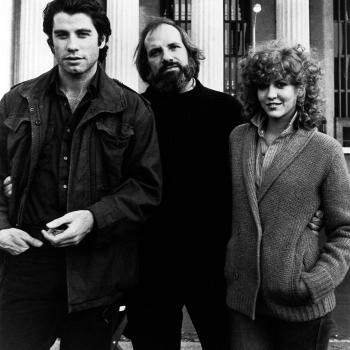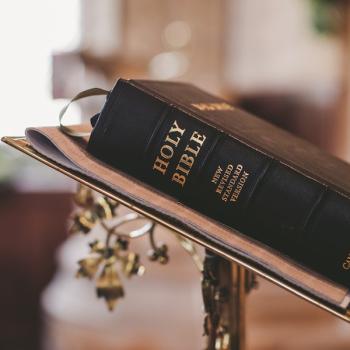
When I became more rigorously Christian, I recall being plagued by the question of prayer. On the one hand, even the nominally Catholic around me would invoke St. Anthony when they lost their keys; I saw my devout friends at Mass, heads bowed, hands clutched together, assumedly asking for something. On the other, I was haunted by a memory from sophomore theology class in high school: my teacher got in front of us and took to lecturing about Exodus, specifically the burning bush episode. He proclaimed that God was He who is—the Tetragrammaton—the god above human manipulation, He whose constancy could not be challenged. Why pray to a god who does not change, but instead asks us to do the changing?
There was a lot of silliness in that class. I recall a student once, in that adolescent way, asking the teacher if Jesus was a zombie. But that moment stuck with me with an undying seriousness.
So central to my conversion was a sense that if a single god existed, He had to be at the center of all things. If He was real, He demanded the fullness of my devotion, my transformation, not His. Plato had worked more in me than I had yet realized.
The answer was simple: pray to be open, to do the will of God. If freedom meant obedience to His will, what more could be asked of me but to try to make myself receptive to His unyielding goodness? Sanctification through attentiveness became my motto.
Attentiveness is a nothingness, a quieted mind and heart meditating on both everything and its opposite: the darkness of closed eyes and silent air, the fundamental lowliness of self and the ultimate grandness of the being beyond all beings.
Augustine, Meister Eckhart, Simone Weil, Thomas Merton, finding Byzantine Catholicism: these all helped me along the way, turned me away from myself and toward nothingness, the divine nothingness. When I sit in the darkness of morning, nothing but a candle in the stillness and a busy day looming ahead, the words of Angelus Silesius rise up from the back of my mind:
God is an utter nothingness,
Beyond the touch of time and place:
The more thou graspest after Him,
The more He fleeth thy embrace.
This is, of course, a reminder that language cannot be escaped. These days I can beg for saints’ intercessions; I can venerate Mary with the knowledge that her own “yes,” her own receptivity to the divine, ought to guide my own. I am a human being and words must bookend my silence. Even the purest prayer brings me back to the coffee-smell of morning and the ringing of my roommate’s alarm.
Silence before praying with the saints brought me to the recognition that they were powerful intercessors; skepticism and meditation led to illumination in the mysteries of the Lord.
Yet the cycle continues. And so, I was happy to discover a prayer in a little book recently. May it help you pray for and in nothingness as it has helped me:
Prayer to Accept the Will of God
By Metropolitan PhilaretLord, I do not know what to ask of You. You alone know what I need. You love me more than I am able to love You. Father, give Your servant that for which I am unable to ask. I do not dare to ask either for a cross or for consolation: I only stand before You. My heart is open to You, and You Yourself see needs of which I am unaware. See and do according to Your mercy. Strike me and heal me; knock me down and lift me up. I show reverence and keep silence before Your holy will: Your destiny for me is beyond understanding. I offer myself as a sacrifice to You. I have no other desire besides the desire to carry out Your will. Teach me how to pray—and You Yourself pray in me! Amen.













